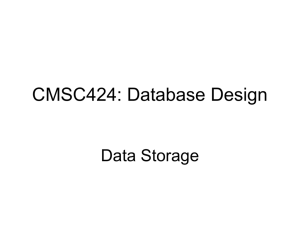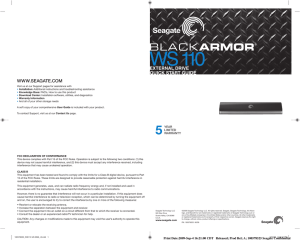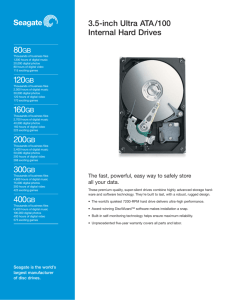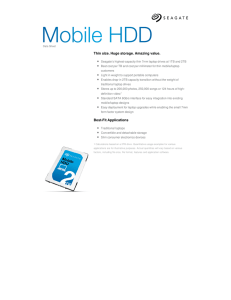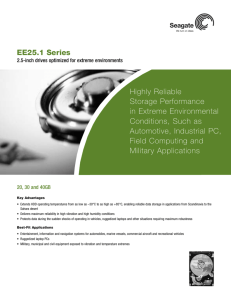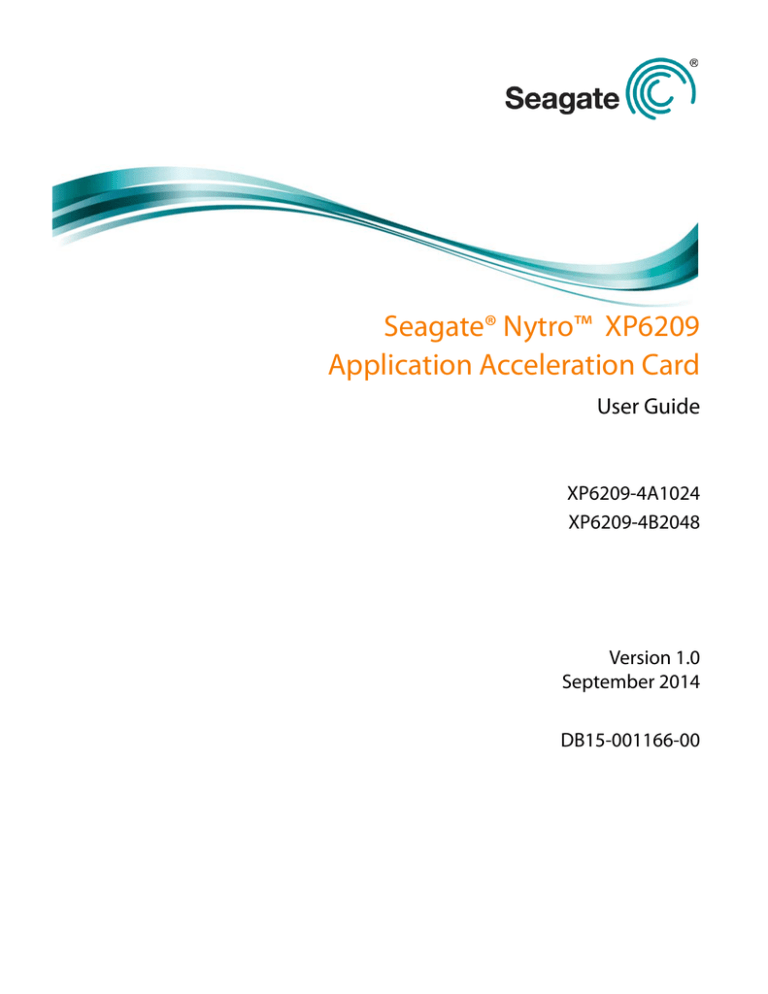
Seagate® Nytro™ XP6209
Application Acceleration Card
User Guide
XP6209-4A1024
XP6209-4B2048
Version 1.0
September 2014
DB15-001166-00
Seagate Nytro XP6209 Application Acceleration Cards User Guide
September 2014
Legal Notices
Electromagnetic Compatibility Notices
This device complies with Part 15 of the FCC Rules. Operation is subject to the following two conditions:
1.
2.
This device may not cause harmful interference, and
This device must accept any interference received, including interference that may cause undesired operation.
This equipment has been tested and found to comply with the limits for a Class B digital device, pursuant to part 15 of the FCC Rules. These limits are designed to provide reasonable
protection against harmful interference in a residential installation. This equipment generates, uses, and can radiate radio frequency energy and, if not installed and used in accordance
with the instructions, may cause harmful interference to radio communications. However, there is no guarantee that interference will not occur in a particular installation. If this
equipment does cause harmful interference to radio or television reception, which can be determined by turning the equipment off and on, the user is encouraged to try to correct the
interference by one or more of the following measures:
·
·
·
·
Reorient or relocate the receiving antenna.
Increase the separation between the equipment and the receiver.
Connect the equipment into an outlet on a circuit different from that to which the receiver is connected.
Consult the dealer or an experienced radio/TV technician for help.
Shielded cables for SCSI connection external to the cabinet are used in the compliance testing of this Product. Seagate is not responsible for any radio or television interference caused
by unauthorized modification of this equipment or the substitution or attachment of connecting cables and equipment other than those specified by Seagate. The correction of
interferences caused by such unauthorized modification, substitution, or attachment will be the responsibility of the user.
The Seagate Nytro XP6209 Application Acceleration Card is tested to comply with FCC standards for home or office use.
This Class B digital apparatus meets all requirements of the Canadian Interference-Causing Equipment Regulations.
Cet appareil numérique de la classe B respecte toutes les exigences du Règlement sur le matériel brouilleur du Canada.
This is a Class B product based on the standard of the Voluntary Control Council for Interference from Information Technology Equipment (VCCI). If this is used near a radio or television
receiver in a domestic environment, it may cause radio interference. Install and use the equipment according to the instruction guide.
© 2014 Seagate Technology LLC. All rights reserved. Printed in USA. Seagate, Seagate Technology and the Wave logo are registered trademarks of Seagate Technology LLC in the United States and/or
other countries. DuraWrite, Nytro, Fusion MPT, and Storage.Networking.Accelerated and SandForce are either trademarks or registered trademarks of Seagate Technology LLC or one of its affiliated
companies in the United States and/or other countries. All other trademarks or registered trademarks are the property of their respective owners. Nytro products are not intended for use in life-support
appliances, devices, or systems. Use of any Nytro product in such applications without written consent of the appropriate Seagate officer is prohibited. Seagate reserves the right to change, without notice,
product offerings or specifications.
Email
support@seagate.com
Website
www.seagate.com
Document Number: DB15-001166-00
Seagate Nytro XP6209 Application Acceleration Cards User Guide
September 2014
Table of Contents
Table of Contents
Chapter 1: Introduction . . . . . . . . . . . . . . . . . . . . . . . . . . . . . . . . . . . . . . . . . . . . . . . . . . . . . . . . . . . . . . . . . . . . . . . . . . . . . . . . . . . . . . . . . . . . . . . . . . . . . . . . . 4
1.1 Overview . . . . . . . . . . . . . . . . . . . . . . . . . . . . . . . . . . . . . . . . . . . . . . . . . . . . . . . . . . . . . . . . . . . . . . . . . . . . . . . . . . . . . . . . . . . . . . . . . . . . . . . . . . . . . . . . . . . . . . . . . . .
1.2 Related Documents . . . . . . . . . . . . . . . . . . . . . . . . . . . . . . . . . . . . . . . . . . . . . . . . . . . . . . . . . . . . . . . . . . . . . . . . . . . . . . . . . . . . . . . . . . . . . . . . . . . . . . . . . . . . . . . . .
1.3 Features . . . . . . . . . . . . . . . . . . . . . . . . . . . . . . . . . . . . . . . . . . . . . . . . . . . . . . . . . . . . . . . . . . . . . . . . . . . . . . . . . . . . . . . . . . . . . . . . . . . . . . . . . . . . . . . . . . . . . . . . . . . .
1.4 Seagate Nytro XP6209 Card Characteristics Summary . . . . . . . . . . . . . . . . . . . . . . . . . . . . . . . . . . . . . . . . . . . . . . . . . . . . . . . . . . . . . . . . . . . . . . . . . . . . . . . .
4
4
4
5
Chapter 2: Installation . . . . . . . . . . . . . . . . . . . . . . . . . . . . . . . . . . . . . . . . . . . . . . . . . . . . . . . . . . . . . . . . . . . . . . . . . . . . . . . . . . . . . . . . . . . . . . . . . . . . . . . . . . 6
2.1 Quick Installation Instructions . . . . . . . . . . . . . . . . . . . . . . . . . . . . . . . . . . . . . . . . . . . . . . . . . . . . . . . . . . . . . . . . . . . . . . . . . . . . . . . . . . . . . . . . . . . . . . . . . . . . . . . 6
2.2 Hardware Installation Instructions . . . . . . . . . . . . . . . . . . . . . . . . . . . . . . . . . . . . . . . . . . . . . . . . . . . . . . . . . . . . . . . . . . . . . . . . . . . . . . . . . . . . . . . . . . . . . . . . . . . 6
2.2.1 Card Retention, Shipping, and the PCIe Specification . . . . . . . . . . . . . . . . . . . . . . . . . . . . . . . . . . . . . . . . . . . . . . . . . . . . . . . . . . . . . . . . . . . . . . . . . . 6
2.2.2 Hardware Installation for the Seagate Nytro XP6209 Cards . . . . . . . . . . . . . . . . . . . . . . . . . . . . . . . . . . . . . . . . . . . . . . . . . . . . . . . . . . . . . . . . . . . . . 6
2.3 Software Installation Instructions . . . . . . . . . . . . . . . . . . . . . . . . . . . . . . . . . . . . . . . . . . . . . . . . . . . . . . . . . . . . . . . . . . . . . . . . . . . . . . . . . . . . . . . . . . . . . . . . . . . . 8
2.3.1 New Windows Driver Installation . . . . . . . . . . . . . . . . . . . . . . . . . . . . . . . . . . . . . . . . . . . . . . . . . . . . . . . . . . . . . . . . . . . . . . . . . . . . . . . . . . . . . . . . . . . . . 8
2.3.2 Existing Windows Driver Installation . . . . . . . . . . . . . . . . . . . . . . . . . . . . . . . . . . . . . . . . . . . . . . . . . . . . . . . . . . . . . . . . . . . . . . . . . . . . . . . . . . . . . . . . . . 8
2.3.3 Linux Driver Installation . . . . . . . . . . . . . . . . . . . . . . . . . . . . . . . . . . . . . . . . . . . . . . . . . . . . . . . . . . . . . . . . . . . . . . . . . . . . . . . . . . . . . . . . . . . . . . . . . . . . . . 9
2.3.4 FreeBSD Driver Installation . . . . . . . . . . . . . . . . . . . . . . . . . . . . . . . . . . . . . . . . . . . . . . . . . . . . . . . . . . . . . . . . . . . . . . . . . . . . . . . . . . . . . . . . . . . . . . . . . . . 9
2.3.5 VMware Driver Installation . . . . . . . . . . . . . . . . . . . . . . . . . . . . . . . . . . . . . . . . . . . . . . . . . . . . . . . . . . . . . . . . . . . . . . . . . . . . . . . . . . . . . . . . . . . . . . . . . . 10
2.3.5.1 VMware ESX4.1 . . . . . . . . . . . . . . . . . . . . . . . . . . . . . . . . . . . . . . . . . . . . . . . . . . . . . . . . . . . . . . . . . . . . . . . . . . . . . . . . . . . . . . . . . . . . . . . . . . . . . . . 10
2.3.5.2 VMware ESX5.0/ESX 5.1 . . . . . . . . . . . . . . . . . . . . . . . . . . . . . . . . . . . . . . . . . . . . . . . . . . . . . . . . . . . . . . . . . . . . . . . . . . . . . . . . . . . . . . . . . . . . . . . 10
2.4 BIOS Boot Support Settings . . . . . . . . . . . . . . . . . . . . . . . . . . . . . . . . . . . . . . . . . . . . . . . . . . . . . . . . . . . . . . . . . . . . . . . . . . . . . . . . . . . . . . . . . . . . . . . . . . . . . . . . 10
2.4.1 Changing the BIOS Settings . . . . . . . . . . . . . . . . . . . . . . . . . . . . . . . . . . . . . . . . . . . . . . . . . . . . . . . . . . . . . . . . . . . . . . . . . . . . . . . . . . . . . . . . . . . . . . . . . 11
2.5 Managing the Seagate Nytro XP6209 Card . . . . . . . . . . . . . . . . . . . . . . . . . . . . . . . . . . . . . . . . . . . . . . . . . . . . . . . . . . . . . . . . . . . . . . . . . . . . . . . . . . . . . . . . . . 13
Chapter 3: Characteristics . . . . . . . . . . . . . . . . . . . . . . . . . . . . . . . . . . . . . . . . . . . . . . . . . . . . . . . . . . . . . . . . . . . . . . . . . . . . . . . . . . . . . . . . . . . . . . . . . . . . . . 14
3.1 Seagate Nytro XP6209 Card Characteristics . . . . . . . . . . . . . . . . . . . . . . . . . . . . . . . . . . . . . . . . . . . . . . . . . . . . . . . . . . . . . . . . . . . . . . . . . . . . . . . . . . . . . . . . .
3.1.1 LEDs . . . . . . . . . . . . . . . . . . . . . . . . . . . . . . . . . . . . . . . . . . . . . . . . . . . . . . . . . . . . . . . . . . . . . . . . . . . . . . . . . . . . . . . . . . . . . . . . . . . . . . . . . . . . . . . . . . . . . . . .
3.1.2 Troubleshooting the Seagate Nytro XP6209 Card . . . . . . . . . . . . . . . . . . . . . . . . . . . . . . . . . . . . . . . . . . . . . . . . . . . . . . . . . . . . . . . . . . . . . . . . . . . . .
3.1.3 Power Consumption . . . . . . . . . . . . . . . . . . . . . . . . . . . . . . . . . . . . . . . . . . . . . . . . . . . . . . . . . . . . . . . . . . . . . . . . . . . . . . . . . . . . . . . . . . . . . . . . . . . . . . . .
3.1.4 Thermal Considerations . . . . . . . . . . . . . . . . . . . . . . . . . . . . . . . . . . . . . . . . . . . . . . . . . . . . . . . . . . . . . . . . . . . . . . . . . . . . . . . . . . . . . . . . . . . . . . . . . . . . .
3.1.4.1 Maximum Sensor Temperature . . . . . . . . . . . . . . . . . . . . . . . . . . . . . . . . . . . . . . . . . . . . . . . . . . . . . . . . . . . . . . . . . . . . . . . . . . . . . . . . . . . . . . .
3.2 Electromagnetic and Environmental Specifications . . . . . . . . . . . . . . . . . . . . . . . . . . . . . . . . . . . . . . . . . . . . . . . . . . . . . . . . . . . . . . . . . . . . . . . . . . . . . . . . .
3.3 Safety Characteristics . . . . . . . . . . . . . . . . . . . . . . . . . . . . . . . . . . . . . . . . . . . . . . . . . . . . . . . . . . . . . . . . . . . . . . . . . . . . . . . . . . . . . . . . . . . . . . . . . . . . . . . . . . . . . .
3.4 Seagate KnowledgeBase . . . . . . . . . . . . . . . . . . . . . . . . . . . . . . . . . . . . . . . . . . . . . . . . . . . . . . . . . . . . . . . . . . . . . . . . . . . . . . . . . . . . . . . . . . . . . . . . . . . . . . . . . . .
3.5 Technical Support . . . . . . . . . . . . . . . . . . . . . . . . . . . . . . . . . . . . . . . . . . . . . . . . . . . . . . . . . . . . . . . . . . . . . . . . . . . . . . . . . . . . . . . . . . . . . . . . . . . . . . . . . . . . . . . . .
Seagate Technology
-3-
14
14
14
16
16
16
17
17
17
17
Seagate Nytro XP6209 Application Acceleration Cards User Guide
September 2014
Chapter 1: Introduction
Overview
Chapter 1: Introduction
1.1
Overview
The Seagate® Nytro™ XP6209 Acceleration Application Card is a block storage device. The card presents to the
operating system through a Fusion-MPT™ interface as multiple drives that require minimal user configuration. You can
use the cards for either nonpersistent (for example, cache) or persistent (for example, database files) data.
The card has Flash ROM for storing the BIOS and firmware, and NVRAM for storing nonvolatile user data. The card has
three LEDs on the PCI bracket to indicate activity, drive life, and status.
The card has a PCI Express® (PCIe®) interface that complies with the PCI Express Specification 2.0 or PCI Express
Specification 3.0.
The card functions through a SAS2008 I/O controller with Seagate Nytro WarpDrive firmware that runs on the internal
processor.
1.2
Related Documents
Refer to the following documents for more information on the Seagate Nytro XP6209 card and related tools.
1.3
Seagate® Nytro™ WarpDrive® and Nytro XP6000 Application Acceleration Card r112.00.51.00 Release Notes
Seagate® Nytro™ WarpDrive® and Nytro XP6000 Application Acceleration Card Management Utility User Guide
Seagate® Nytro™ XP6209 Application Acceleration Card Quick Installation Guide
Features
This section lists the features of the Seagate Nytro XP6209 card.
Proven enterprise firmware stack
Best-in-class read and write performance
Average latency of less than 50 ms
Low host burden – No static CPU and memory overhead
Support for Windows® and Linux® operating systems
Support for VMware® and FreeBSD® operating systems
Bootable
PCIe 2.0, x8
PCIe standard or low-profile bracket
LEDs for data activity, drive life, and drive status
High reliability with block-level, page-level, and die-level failure protection
Seagate Technology
-4-
Seagate Nytro XP6209 Application Acceleration Cards User Guide
September 2014
1.4
Chapter 1: Introduction
Seagate Nytro XP6209 Card Characteristics Summary
Seagate Nytro XP6209 Card Characteristics Summary
The Seagate Nytro XP6209 cards contain Flash ROM for storing the BIOS and firmware. Three LEDs are located on the
PCI bracket to indicate activity, drive life, and status.
The following table shows the characteristics of each Seagate Nytro XP6209 card models.
Table 1 Seagate Nytro XP6209 Card Characteristics Summary
Device Name
Model Name
Usable
Capacity
Connector
Flash
Controller
NAND Type
Card Style
Controller
Seagate Nytro XP6209
XP6209-4A1024
930 GB
X8 PCIe 2.0
SF2582
MLC
HHHL
SAS2008
Seagate Nytro XP6209
XP6209-4B2048
1796 GB
X8 PCIe 2.0
SF2582
MLC
HHHL
SAS2008
Seagate Technology
-5-
Seagate Nytro XP6209 Application Acceleration Cards User Guide
September 2014
Chapter 2: Installation
Quick Installation Instructions
Chapter 2: Installation
2.1
Quick Installation Instructions
You can use the quick installation instructions to install your Seagate Nytro XP6209 card, or you can see the next
section if you need more detailed installation instructions.
To quickly install your Seagate Nytro XP6209 card, follow these instructions.
1.
Unpack the Seagate Nytro XP6209 card and inspect it for damage.
2.
Turn off the server, and remove the power cord.
3.
Remove the cover from the server.
4.
Insert the card in an available PCIe slot.
5.
Secure the bracket to the system’s chassis.
6.
Replace the cover and the power cord, then turn on the server.
The Seagate Nytro XP6209 card hardware installation is complete.
2.2
Hardware Installation Instructions
2.2.1
Card Retention, Shipping, and the PCIe Specification
The PCIe specification requires that add-in cards with a mass of greater than 350 grams must have additional card
retention at the server level. Neither the connector nor the optional hockey stick feature described in the PCIe
specification provides the required retention.
Server OEMs and ODMs are solely responsible for choosing and qualifying their own server and rack shipping
solution. Seagate does not qualify the server and rack shipping solution and is not responsible for such solution or any
impact to Seagate products.
Seagate will make available mechanical design collateral for its products, which may be used by server OEMs and
ODMs to design retention features for their server products. Seagate information is provided AS IS only and Seagate
does not certify any design retention features used by OEMs and ODMs.
Seagate does not perform server and rack shock and vibration testing of OEM and ODM products. OEMs and ODMs
are solely responsible for any server and rack shock and vibration testing.
2.2.2
Hardware Installation for the Seagate Nytro XP6209 Cards
1.
Unpack the Seagate Nytro XP6209 card and inspect it for damage. Unpack the card in a static-free
environment and follow good antistatic grounding procedures. Remove the Seagate Nytro XP6209 card from the
antistatic bag, and carefully inspect it for damage. If you notice any damage, contact Seagate, or your reseller
support representative.
NOTE
Back up your data before changing your system configuration.
Seagate Technology
-6-
Seagate Nytro XP6209 Application Acceleration Cards User Guide
September 2014
2.
Chapter 2: Installation
Hardware Installation Instructions
Prepare the computer. Turn off the server, and disconnect the power cords from the power supply. Remove the
cover from the chassis.
WARNING
To avoid electrical shock, disconnect the server from the main power
and from any networks before you install the card.
3.
Replace the PCI mounting bracket (system dependent). If required for your system, replace the shorter PCI
mounting bracket that ships on the Seagate Nytro XP6209 card with the full-height bracket supplied. Save the
two screws from the short bracket and use the screws to attach the full-height bracket.
4.
Insert the Seagate Nytro XP6209 card in an available PCIe slot. Locate an empty PCIe slot. Remove the blank
bracket panel on the server chassis that aligns with the empty PCIe slot. Save the bracket screw, if applicable.
Align the card to the PCIe slot. Press down gently, but firmly, to properly seat the card in the slot. The following
figure shows how to insert the card in a PCIe slot.
Figure 1 Card Installation for the Seagate Nytro XP6209 Cards
Bracket
Screw
Press
Here
Press
Here
32-bit Slot
(3.3 V Only)
Edge of
Host Board
PCI Express x8 Slot
64-bit Slot
(3.3 V Only)
3_00200-00
NOTE
5.
The shape, size, and locations of components on your Seagate Nytro
XP6209 card might vary from this illustration.
For highest performance, make sure that the PCIe slot is PCIe 2.0 and make sure that it has an active width of
dedicated eight lanes. The Seagate Nytro XP6209 card functions with an active width of four lanes or two lanes,
but with reduced performance.
Seagate Technology
-7-
Seagate Nytro XP6209 Application Acceleration Cards User Guide
September 2014
Chapter 2: Installation
Software Installation Instructions
2.3
Software Installation Instructions
2.3.1
New Windows Driver Installation
The Seagate drivers for Windows Server® 2012 (x86, x64, or IA64), and Windows Server 2008 (x86, x64, or IA64) are
available online at the link listed in step 1.
To load the Seagate driver during a new Windows system installation, you can boot directly from the Microsoft®
installation CD-ROM.
To install a new Windows operating system and its appropriate device driver, follow these steps:
1.
Follow the links on the Seagate USB drive to download the Windows driver from the Seagate website at
http://www.seagate.com/support/downloads/
NOTE
On the website, to enter a product name, use the model name
from Table 1 in this document.
2.
Copy the appropriate driver files to installation media, such as a USB device. You will be prompted for the driver
during the Windows installation.
3.
Open the file and follow the directions in the seagate_sss_[OperatingSystemName].txt file.
Consult the ReadMe.txt file available online with the driver for more information. To open the readme file, click the
plus sign next to the title of the driver.
2.3.2
Existing Windows Driver Installation
The following steps contain a sample driver installation for Windows Server 2008. Seagate Nytro WarpDrive cards have
inbox driver support at Windows. Additional versions of Windows drivers are available online. Consult the
ReadMe.txt file for each driver. To open the readme file, click the plus sign next to the title of the driver. For Seagate
downloads, go to:
http://www.seagate.com/support/downloads/
The Seagate drivers for Windows Server 2012 (x86, x64, or IA64) and Windows Server 2008 (x86, x64, or IA64) are
available online. Use the following procedure to install or upgrade the driver onto an existing
Windows Server 2008 system.
1.
Boot Windows Server 2008 and log on as a user with Administrator privileges.
2.
Click the Start button, then right-click the My Computer entry in the menu.
3.
Click the Properties selection.
4.
Click the Hardware tab, then click the Device Manager button.
5.
Click the + to the left of the SCSI and RAID controllers line. Find the adapter desired for the driver upgrade and
double-click the entry. Click on the Driver tab.
6.
Information on the currently installed driver is displayed, and you can view additional driver details by clicking
the Driver Details button.
7.
Click the Update Driver button to update the existing driver. The Hardware Update Wizard begins.
8.
Click the Install from a list or specific location button to select it, then click the Next button.
9.
Click the Don't search, I will choose the driver to install button to select it, then click the Next button.
10. Click the Have Disk button and type the path to the driver, or click the Browse button. Select the location for the
driver package that matches the processor architecture of the system (x86, IA64, or x64). After the path to the
driver has been established, click the OK button.
11. Select the driver from the list and click the Next button.
Seagate Technology
-8-
Seagate Nytro XP6209 Application Acceleration Cards User Guide
September 2014
Chapter 2: Installation
Software Installation Instructions
12. Click the Next button again to start the driver update. In some cases, a message displays indicating that this
driver has not passed logo testing. This message informs you that a nonsigned driver is being installed.
NOTE
Drivers are digitally signed by the Microsoft Windows Hardware
Quality Lab (WHQL) on completion of logo testing. Because of the
time lag between the general customer release by Seagate of
Windows drivers and the completion of WHQL logo testing, some
drivers distributed with adapters or downloaded from the
www.seagate.com website might not be digitally signed.
13. Click the STOP Installation button to cancel the installation if a nonsigned driver is not desired. You will not be
able to install the Seagate Nytro XP6209 card.
or
Click the Continue Anyway button to continue the installation.
The system loads the driver. A message box might display that indicates that the target (existing) driver is newer
than the source (upgrade) driver.
14. Click No to cancel the driver upgrade at this point.
or
Click Yes to continue the installation.
The system copies the driver to the system disk. For any adapter other than the boot adapter, the updated driver
becomes active immediately. For the boot adapter, a message box displays that indicates that you must reboot
your system for the new driver to take effect.
15. Click the Finish button to complete the driver upgrade.
Download the latest Windows drivers from the Seagate website. Consult the ReadMe.txt file available online with
the driver if more detail is needed. To open the readme file, click the plus sign next to the title of the driver.
2.3.3
Linux Driver Installation
Download the latest Linux drivers from the Seagate website. Seagate Nytro WarpDrive cards have in-kernel driver
support. This means that the Linux driver for supported versions of Linux is included in kernel. This makes installation
of Seagate Nytro WarpDrive cards as primary or secondary storage very easy. Boot from the Linux installation media
and the driver for the Seagate Nytro WarpDrive card automatically loads. The driver that is included in kernel is not the
latest version of the driver. For best performance, upgrade to the latest driver.
Consult the Linux ReadMe.txt file available online with the driver. To open the readme file, click the plus sign
next to the title of the driver. For Seagate downloads, go to:
http://www.seagate.com/support/downloads/
Seagate provides open source drivers in the following ways:
2.3.4
Precompiled binaries to add to an existing installation using driver update disks or RPMs for
selected distributions.
Fusion-MPT source to add or update any distribution.
FreeBSD Driver Installation
Download the latest FreeBSD drivers from the Seagate website. Consult the FreeBSDReadMe.txt file available
online with the driver. To open the readme file, click the plus sign next to the title of the driver. For Seagate downloads,
go to:
http://www.seagate.com/support/downloads/
Seagate Technology
-9-
Seagate Nytro XP6209 Application Acceleration Cards User Guide
September 2014
Chapter 2: Installation
BIOS Boot Support Settings
Seagate provides open source drivers in the following way:
Precompiled binaries to add to a supported installation using pre-compiled .ko files.
2.3.5
VMware Driver Installation
2.3.5.1
VMware ESX4.1
Download the latest VMware ESX4.1 driver from the Seagate website at
http://www.seagate.com/support/downloads/
Installation information is available at
knowledge.seagate.com
2.3.5.2
VMware ESX5.0/ESX 5.1
Use the following steps to download the latest VMware ESX5.0 or ESX 5.1 driver from the VMware website:
2.4
1.
Go to this website http://www.vmware.com/resources/compatibility/search.php?deviceCategory=io.
2.
Search for the device with the vendor ID (VID) 1000 and the device ID (DID) 007E.
3.
Click on your Nytro WarpDrive model link from the search result.
4.
Copy the information string under Device Driver(s).
5.
Go to this website https://my.vmware.com/web/vmware/downloads to download the driver.
6.
Enter the information string in the search box.
7.
Click on the topmost link of the search results.
8.
After you download the driver zip file, refer to the readme.txt file for all installation instructions.
BIOS Boot Support Settings
The Seagate Nytro WarpDrive BIOS permits you to change the card properties. You can specify that the card is eligible
for Seagate software control or that the card is reserved for control by software that does not belong to Seagate. You
can select from the following settings in the Boot Support feature of the BIOS:
Enabled BIOS and OS permits the BIOS and the operating system driver to control the card.
Enabled BIOS Only permits the BIOS to control the card. The operating system driver does not control the card. Some
operating system drivers (such as Windows drivers) do not support this option.
Enabled OS Only permits the operating system to control the card. The BIOS does not control the card with this setting.
Disabled prevents the motherboard from considering the card as a boot device. Therefore you cannot boot from the
card. However, you can still see the card when you use the configuration protocol, and in all other respects, the card
performs as usual. You can use this option when you have multiple cards in your system and you do not plan to boot
from this card.
Changes to these settings display in the Status field on the main Adapter List menu. The new setting takes effect when
the BIOS reloads when you reboot the system.
Selecting Disabled prevents the user from booting the WarpDrive, but in all other respects the WarpDrive will work
the same.
Seagate Technology
- 10 -
Seagate Nytro XP6209 Application Acceleration Cards User Guide
September 2014
2.4.1
Chapter 2: Installation
BIOS Boot Support Settings
Changing the BIOS Settings
To change the BIOS settings, follow these instructions:
1.
At power-on, press Ctrl-C to log on to the BIOS screen.
NOTE
The model number, date, and firmware number for your Seagate Nytro
XP6209 card will vary from the illustrations below.
Figure 2 The BIOS Screen
Seagate Technology
- 11 -
Seagate Nytro XP6209 Application Acceleration Cards User Guide
September 2014
2.
Chapter 2: Installation
BIOS Boot Support Settings
Press Enter to go to Adapter Properties.
Figure 3 The Adapter Properties Screen
Seagate Technology
- 12 -
Seagate Nytro XP6209 Application Acceleration Cards User Guide
September 2014
3.
Chapter 2: Installation
Managing the Seagate Nytro XP6209 Card
To toggle between the Boot Support settings, use the -/+/ Enter keys.
Figure 4 The Disabled Boot Support Setting
4.
2.5
Press Esc to exit the BIOS menu.
Managing the Seagate Nytro XP6209 Card
You can use the following tools to manage your Seagate Nytro XP6209 card:
BIOS This tool is available only during boot. Use this tool to view information about the card and to configure the
boot support options. See BIOS Boot Support Settings.
DDCLI This menu-driven, command line interface tool permits you to view information, view the status, and flash
upgrade the firmware for the Seagate Nytro XP6209 card. Refer to the Seagate Nytro™ WarpDrive® and Nytro XP6000
Application Acceleration Card Management Utility User Guide.
Seagate Technology
- 13 -
Seagate Nytro XP6209 Application Acceleration Cards User Guide
September 2014
Chapter 3: Characteristics
Seagate Nytro XP6209 Card Characteristics
Chapter 3: Characteristics
This chapter presents characteristics for the Seagate Nytro XP6209 WarpDrive Application Acceleration Card.
3.1
Seagate Nytro XP6209 Card Characteristics
The Seagate Nytro XP6209 card uses a low-profile, half-height, and half-length PCIe board.
The Seagate Nytro XP6209 card uses a SAS2008 controller with the DirectDrive firmware that runs on its internal
processor. The controller connects to up to four embedded flash modules. You can use the Seagate Nytro XP6209 card
for either persistent or nonpersistent data and the card offers high-performance with consistent low latency with a
low host CPU and DRAM burden.
The following figure shows the Seagate Nytro XP6209 card.
Figure 5 Seagate Nytro XP6209 Card
3.1.1
LEDs
Three board-mounted, right-angle LEDs shine through holes in the PCI bracket: one is for data activity, one is for drive
life, and one is for drive status. The LEDs are labeled on the bracket.
3.1.2
Troubleshooting the Seagate Nytro XP6209 Card
The LEDs provide status information to diagnose problems with the Seagate Nytro XP6209 card. The following figure
shows the LED layout.
Seagate Technology
- 14 -
Seagate Nytro XP6209 Application Acceleration Cards User Guide
September 2014
Chapter 3: Characteristics
Seagate Nytro XP6209 Card Characteristics
Figure 6 Seagate Nytro XP6209 LED Diagram
,IFE
3TATUS
!CTIVITY
,IFETUS
3TAIVITY
T
!C
?
Table 2 Status Indicators on a Running System
Name
Color
LED Description
Activity
Green
On, blinking - Indicates data activity on the card. No action required.
Life
Green
On, steady - Card has sufficient life remaining for programming and erasing the Flash memory.
No action required.
Yellow
On, steady - Card has approximately 20% or less of life remaining for programming and erasing the
Flash memory. Plan for replacements.
Red
On, steady - Card has no program or erase cycles left. Data can be read, but writes are at risk.
Back up data and copy to a new Seagate Nytro XP6209 card.
Green
On, steady - Normal.
On, blinking - Lets the user locate a specific Seagate Nytro XP62096209 card in a rack of servers.
Yellow
On, steady - Warning. One of the following conditions applies:
Temperature warning. If this condition persists, you might damage your Seagate Nytro XP6209
card. Increase cooling for the card or shut down your system to prevent damage.
Other component issues: Run the list and health commands in the ddcli utility to determine
which component has an issue.
Red
On, blinking - Firmware fault code:
Run the ddcli utility to determine which component has an issue.
If no information appears, reboot the system and retry.
If no information appears, call your field application engineer.
Status
On, steady - One of the following conditions applies:
One or more SSDs failed.
Failed RAID volume (DD mode).
No RAID volume is configured (DD mode).
At least one SSD has exceeded its temperature.
Backup power store failed.
Other component issues: Run the list and health commands in the ddcli utility to determine
which component has an issue.
If no information appears, reboot the system and retry the utility (DD mode).
If you experience a problem with your Seagate Nytro XP6209 card that you cannot resolve, report it to your FAE. Or if
you obtained the product from an OEM, report it to the OEM. Keep these tips in mind when reporting a problem:
Seagate Technology
- 15 -
Seagate Nytro XP6209 Application Acceleration Cards User Guide
September 2014
3.1.3
Chapter 3: Characteristics
Seagate Nytro XP6209 Card Characteristics
Clearly identify and report the revision level of the Seagate Nytro XP6209 card. To view this information, use the
ddcli command, Option 1.
Report the part number (for example, L3-25256-00C) listed on the label, and clearly identify the board revision.
Describe the steps leading up to the error.
Report the operating system version and the host driver version.
Power Consumption
The Seagate Nytro XP6209 card receives power from the PCIe 12-V and 3.3-V power rails.
Use the following data for power consumption.
Table 3 Power Consumption
Model
Idle
Typical Power I/O
Maximum Power I/O
XP6209-4A1024
11.3 W
16.5 W
17.5 W
XP6209-4B2048
11.8 W
18.3 W
19.7 W
NOTE
For the XP6209-4A1024, typical power I/O was measured at 8-KB,
random access, 30% write, 70% read, Queue Depth (QD)=32/SSD.
Maximum power I/O was measured at 4-KB, random access, 0% write,
100% read, QD=32/SSD.
NOTE
3.1.4
XP6209-4B2048 typical power I/O was measured at 8-KB, random
access, 30% write, 70% read, QD=32/SSD. Maximum power I/O was
measured at 8-KB, sequential access, 100% write, 0% read,
QD=32/SSD.
Thermal Considerations
The board is designed to operate in an environment defined by the following parameters:
Temperature range:
Relative humidity range:
Maximum wet bulb temperature:
Minimum airflow:
0 °C to 50 °C
5% to 90% noncondensing
28 °C
250 LFM
The board is designed for the following storage and transit environmental parameters:
3.1.4.1
Temperature range:
Relative humidity range:
–20 °C to 75 °C
5% to 95% noncondensing
Maximum Sensor Temperature
System design and cooling capacity variations can affect the actual airflow delivered to the Seagate Nytro XP6209
cards. System-level fan speeds might require adjustment to make sure that the Seagate Nytro XP6209 sensor
temperature does not exceed the maximums. Here are the maximum sensor temperatures for the Seagate Nytro
XP6209 cards:
XP6209-4A1024: 70°C.
XP6209-4B2048: 80°C
Seagate Technology
- 16 -
Seagate Nytro XP6209 Application Acceleration Cards User Guide
September 2014
3.2
Chapter 3: Characteristics
Electromagnetic and Environmental Specifications
Electromagnetic and Environmental Specifications
The Seagate Nytro XP6209 card is designed to minimize electromagnetic emissions, susceptibility to radio frequency
energy, and the effects of electrostatic discharge. The card carries the CE mark, C-Tick mark, Canadian Compliance
Statement, KCC, HF, Taiwan BSMI, Japan VCCI, and FCC Class B, GOST, and the card is marked with the FCC
Self-Certification logo. The card also meets the requirements of CISPR Class B.
3.3
Safety Characteristics
All Seagate PCIe boards meet or exceed the requirements of UL flammability rating 94V-0. Each bare board is marked
with the supplier’s name or trademark, type, and UL flammability rating. Because these boards are installed in a PCIe
bus slot, all voltages are below the SELV 42.4-V limit.
3.4
Seagate KnowledgeBase
The Seagate KnowledgeBase website provides resources for customers. It includes articles on performance tuning
and troubleshooting. For KnowledgeBase website information, go to:
knowledge.seagate.com
3.5
Technical Support
For information regarding online support and services, visit:
http://www.seagate.com/about/contact-us/technical-support/
Available services include:
Presales & Technical support
Global Support Services telephone numbers & business hours
Authorized Service Centers
For information regarding Warranty Support, visit: http://www.seagate.com/support/warranty-and-replacements/
For information regarding data recovery services, visit:
http://www.seagate.com/services-software/data-recovery-services/
For Seagate OEM and Distribution partner portal, visit: http://www.seagate.com/partners/
For Seagate reseller portal, visit: http://www.seagate.com/partners/my-spp-dashboard/
Seagate Technology
- 17 -
Seagate Technology LLC
920 Disc Drive, Scotts Valley, California 95066-4544, USA
Publication Number: DB15-001166-00, Printed in U.S.A.


